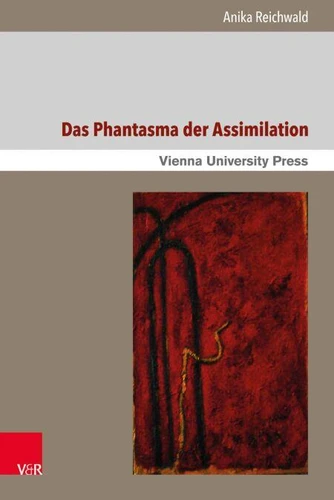Das Phantasma der Assimilation. Interpretationen des »Jüdischen« in der deutschen Phantastik 1890–1930
Par :Formats :
Disponible dans votre compte client Decitre ou Furet du Nord dès validation de votre commande. Le format PDF est :
- Compatible avec une lecture sur My Vivlio (smartphone, tablette, ordinateur)
- Compatible avec une lecture sur liseuses Vivlio
- Pour les liseuses autres que Vivlio, vous devez utiliser le logiciel Adobe Digital Edition. Non compatible avec la lecture sur les liseuses Kindle, Remarkable et Sony
 , qui est-ce ?
, qui est-ce ?Notre partenaire de plateforme de lecture numérique où vous retrouverez l'ensemble de vos ebooks gratuitement
Pour en savoir plus sur nos ebooks, consultez notre aide en ligne ici
- Nombre de pages374
- FormatPDF
- ISBN978-3-8470-0703-6
- EAN9783847007036
- Date de parution03/04/2017
- Protection num.pas de protection
- Taille5 Mo
- Infos supplémentairespdf
- ÉditeurV&R Unipress
Résumé
Die deutschsprachige phantastische Literatur um die Jahrhundertwende verhandelt das Phänomen der jüdischen Assimilation im außerjüdischen Diskurs auf vielfältige und äußerst reflektierte Weise. Phantastik erscheint als prädestiniertes Genre, um jüdische Assimilation in ihrem historischen, sozio- und kulturpolitischen Kontext zu begreifen. Gegenüber dem zeitgenössischen Diskurs offenbart sie ein reflektiertes Verständnis von Assimilation.
Der Blick in ausgewählte Beispiele phantastischer Literatur nichtjüdischer Autoren zeigt die Vielfalt der Motivik und Darstellungsformen sowie ihr subversives Potential. Die Studie untersucht, wie unterschiedliche Transformationsprozesse über Motive wie den Doppelgänger, Vampir oder die Chimäre beschrieben werden, und zeichnet dabei auch die gesellschaftlichen Debatten um jüdische Assimilation nach. Fantasy is predestined to present Jewish assimilation in its very complex historical as well as socio- and cultural political contexts and at the same time reveals a reflected temporary knowledge of assimilation - against the common discourse.
Chosen examples of fantasy literature by non-Jewish authors show the variety of motives and depiction of various processes of transformation as well as the subversive of fantasy literature. This study analyses how motives like the doppelganger, vampire or chimera describe different forms of transformation; and traces the spoors of historical debates about Jewish assimilation in the texts.
Der Blick in ausgewählte Beispiele phantastischer Literatur nichtjüdischer Autoren zeigt die Vielfalt der Motivik und Darstellungsformen sowie ihr subversives Potential. Die Studie untersucht, wie unterschiedliche Transformationsprozesse über Motive wie den Doppelgänger, Vampir oder die Chimäre beschrieben werden, und zeichnet dabei auch die gesellschaftlichen Debatten um jüdische Assimilation nach. Fantasy is predestined to present Jewish assimilation in its very complex historical as well as socio- and cultural political contexts and at the same time reveals a reflected temporary knowledge of assimilation - against the common discourse.
Chosen examples of fantasy literature by non-Jewish authors show the variety of motives and depiction of various processes of transformation as well as the subversive of fantasy literature. This study analyses how motives like the doppelganger, vampire or chimera describe different forms of transformation; and traces the spoors of historical debates about Jewish assimilation in the texts.
Die deutschsprachige phantastische Literatur um die Jahrhundertwende verhandelt das Phänomen der jüdischen Assimilation im außerjüdischen Diskurs auf vielfältige und äußerst reflektierte Weise. Phantastik erscheint als prädestiniertes Genre, um jüdische Assimilation in ihrem historischen, sozio- und kulturpolitischen Kontext zu begreifen. Gegenüber dem zeitgenössischen Diskurs offenbart sie ein reflektiertes Verständnis von Assimilation.
Der Blick in ausgewählte Beispiele phantastischer Literatur nichtjüdischer Autoren zeigt die Vielfalt der Motivik und Darstellungsformen sowie ihr subversives Potential. Die Studie untersucht, wie unterschiedliche Transformationsprozesse über Motive wie den Doppelgänger, Vampir oder die Chimäre beschrieben werden, und zeichnet dabei auch die gesellschaftlichen Debatten um jüdische Assimilation nach. Fantasy is predestined to present Jewish assimilation in its very complex historical as well as socio- and cultural political contexts and at the same time reveals a reflected temporary knowledge of assimilation - against the common discourse.
Chosen examples of fantasy literature by non-Jewish authors show the variety of motives and depiction of various processes of transformation as well as the subversive of fantasy literature. This study analyses how motives like the doppelganger, vampire or chimera describe different forms of transformation; and traces the spoors of historical debates about Jewish assimilation in the texts.
Der Blick in ausgewählte Beispiele phantastischer Literatur nichtjüdischer Autoren zeigt die Vielfalt der Motivik und Darstellungsformen sowie ihr subversives Potential. Die Studie untersucht, wie unterschiedliche Transformationsprozesse über Motive wie den Doppelgänger, Vampir oder die Chimäre beschrieben werden, und zeichnet dabei auch die gesellschaftlichen Debatten um jüdische Assimilation nach. Fantasy is predestined to present Jewish assimilation in its very complex historical as well as socio- and cultural political contexts and at the same time reveals a reflected temporary knowledge of assimilation - against the common discourse.
Chosen examples of fantasy literature by non-Jewish authors show the variety of motives and depiction of various processes of transformation as well as the subversive of fantasy literature. This study analyses how motives like the doppelganger, vampire or chimera describe different forms of transformation; and traces the spoors of historical debates about Jewish assimilation in the texts.




